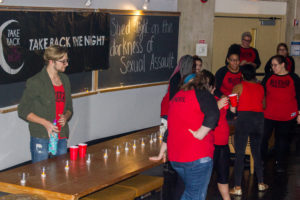
ZOE KIRIAZIS
Staff Writer
Survivors, friends, strangers and colleagues participated in Fredonia Feminist’s most anticipated event of the year, Take Back the Night, on Nov. 2.
Take Back the Night at Fredonia is an event where survivors of sexual assault, sexual harassment and rape come to confidentially talk about their experiences. Take Back the Night was part of Fredonia’s “It’s On Us” campaign, which provides sexual assault awareness and prevention on college campuses. Junior music industry and women’s and gender studies major Sydney Flanagan, president of Fredonia Feminists, provided a brief history of Take Back the Night before survivors began to speak about their experiences.
In October of 1975, microbiologist Susan Alexander Speeth was walking home alone one night when she was tragically stabbed to death in Philadelphia. What started as a night to discuss the safety of women at night has branched out to include all forms of sexual assault and unsafety of women in our society. For the last 41 years, over thousands upon thousands of events, rallies and marches have been held in the U.S. annually.
Counselors from LoGrasso Hall’s counseling center were in attendance for anyone, survivor or not, to support whomever needed it. Presenter Julie Bezek, CEASE coordinator and counselor at LoGrasso Hall, talked about the various resources Fredonia offers for survivors of sexual assault ranging from restraining orders to prosecution within Judicial Affairs or the county’s district attorney.
S.T.E.P.S, a student-led sex education group, presented three skits on sexual assault. S.T.E.P.S talked about date rape, coercion rape and acquaintance rape. The most common rape crime to happen is acquaintance rape, when the survivor and perpetrator have some sort of relationship together, whether it is a friend, coworker, classmate, friend of a friend and more.
S.T.E.P.S explained that the stereotype of someone jumping out of the bushes at night and sexually assaulting rarely happens. Statistically, 57 percent of rapes are committed by acquaintances, 34 percent by family members and 7 percent by strangers.
S.T.E.P.S presenter and sophomore theatre arts and women’s and gender studies major Shana Gordon believes that it is important to discuss the various types of rape crimes because it is a reality that college students might face.
“Rape isn’t an exclusive thing. It can happen to anyone,” Gordon explained. Each skit performed included couples and relationships that were not primarily heterosexual couples encompassing that these crimes happen to any person, regardless of gender, sexual identity and gender expression.
According to RAINN, the United States’ largest anti-sexual assault organization, one in six women and one in 33 men will experience attempted rape or completed rape in their lifetime. Every 109 seconds someone experiences sexual assault.
A room full of friends and strangers came together as, one by one, a survivor shared their story. There was not a dry eye in the room. Some survivors were sharing their stories for the first time while others were sharing again. The stigma and silence of sexual assault survivors slipped away with each person who spoke.
The executive board of Fredonia Feminists ended the event with a candlelight vigil to symbolize shining the light on talking about sexual assault, on those who are survivors and on those we have lost from sexual assault crimes.
